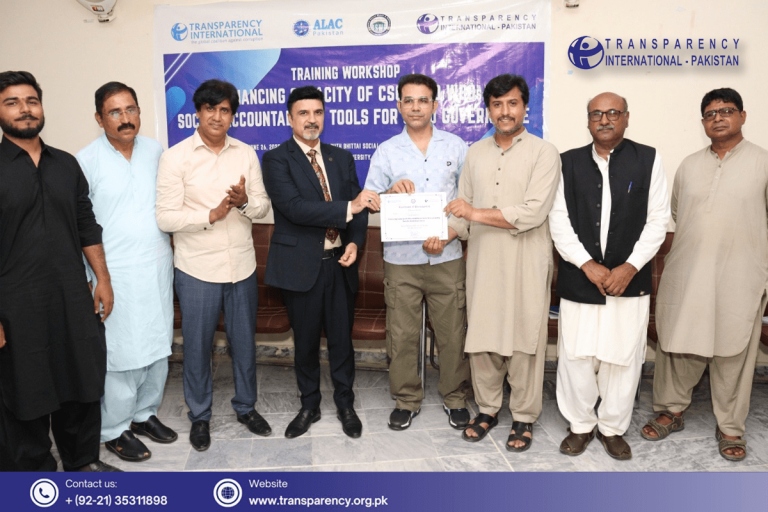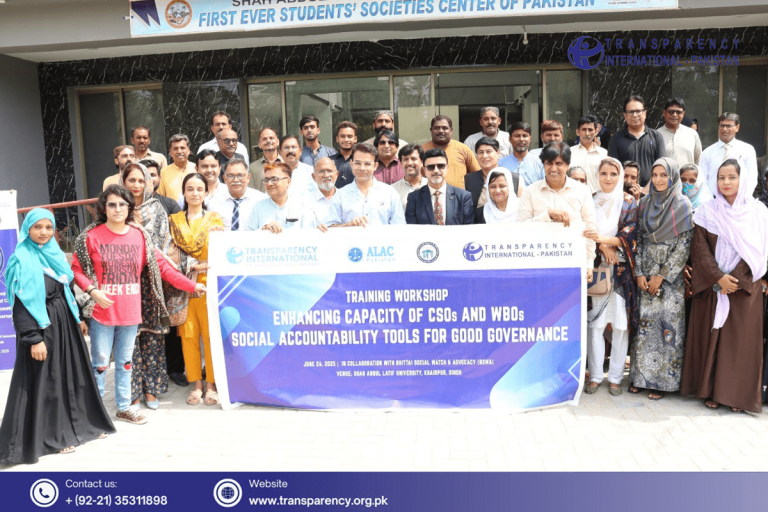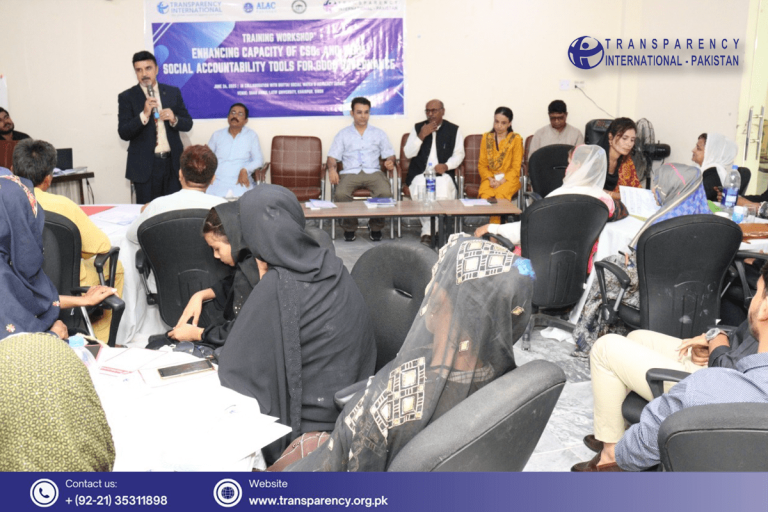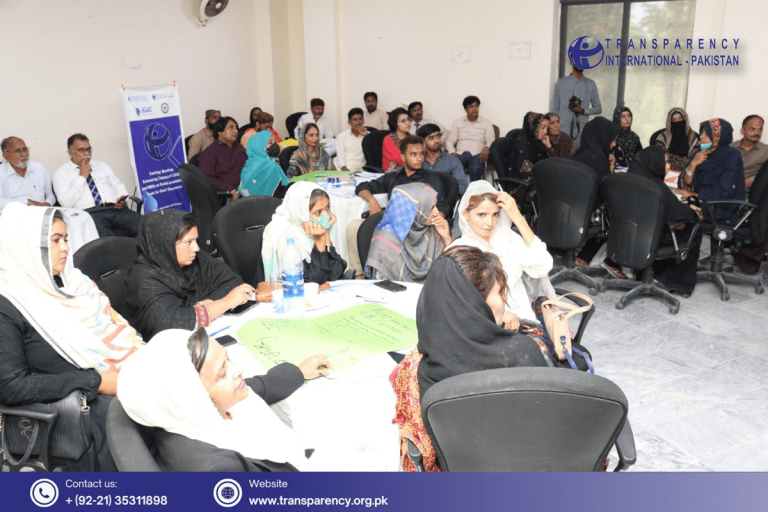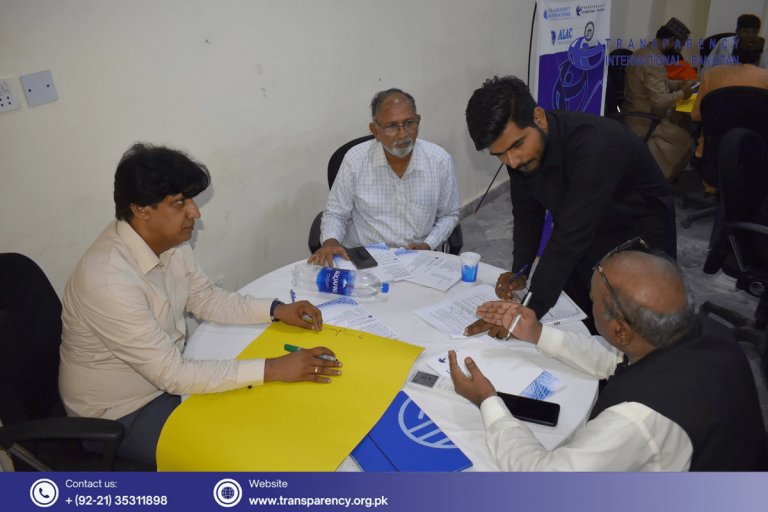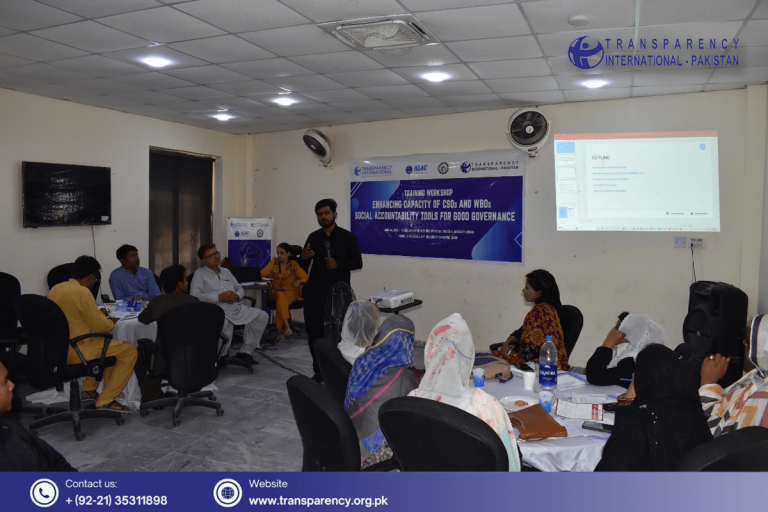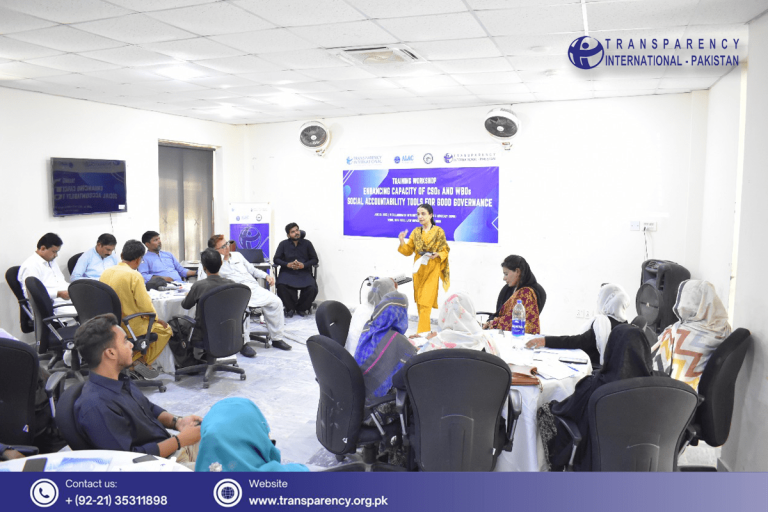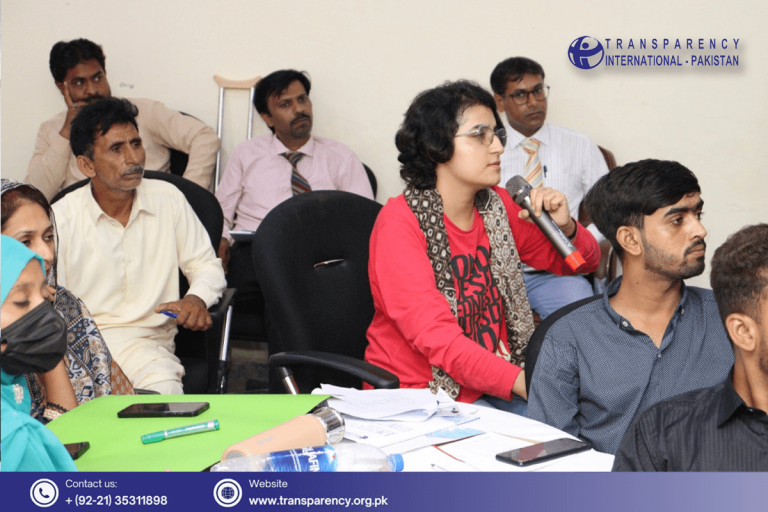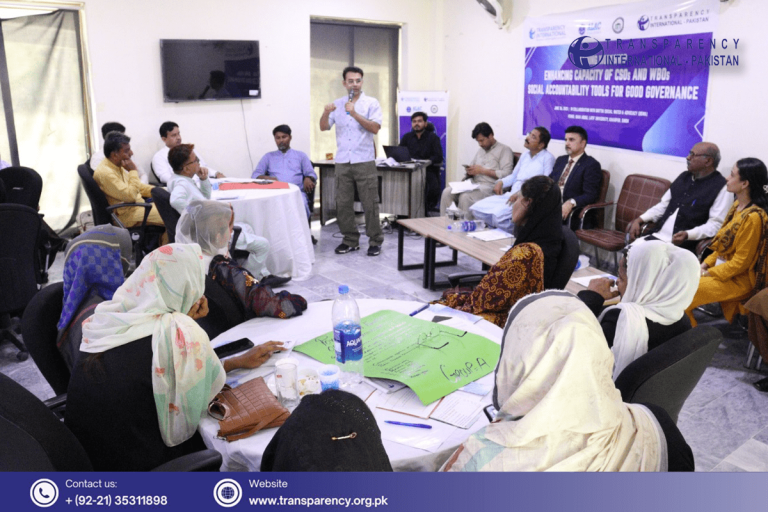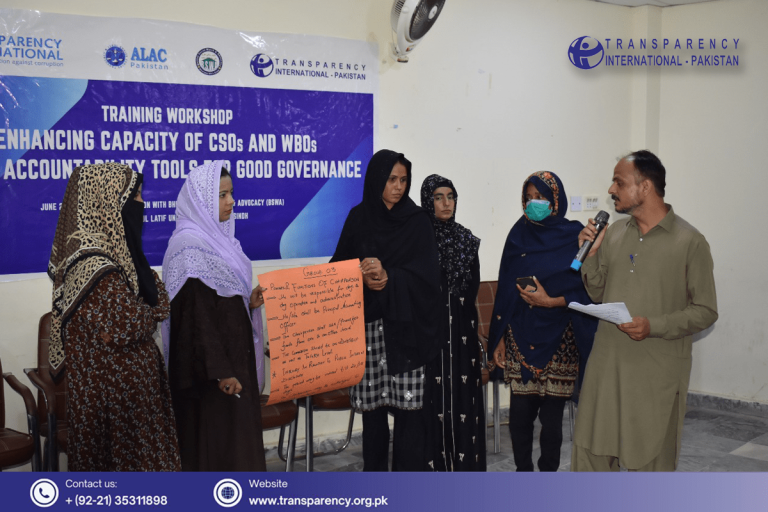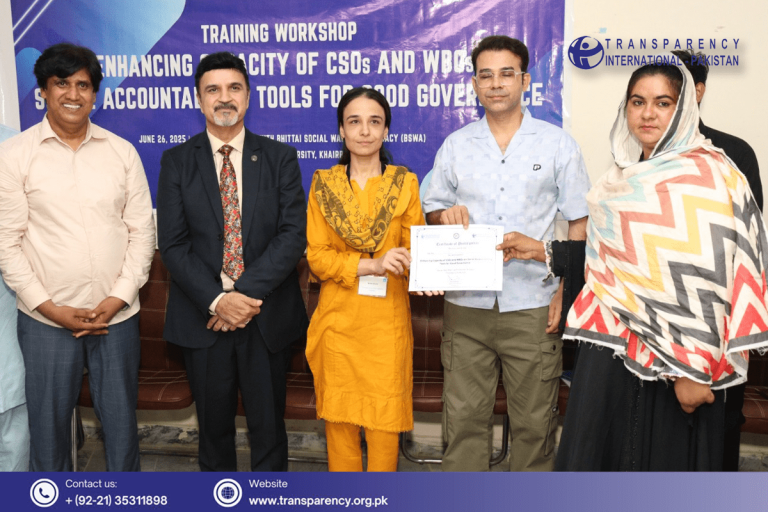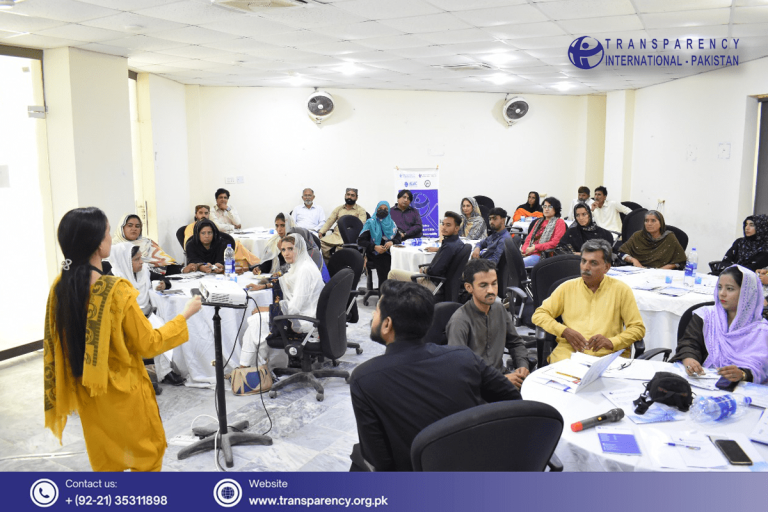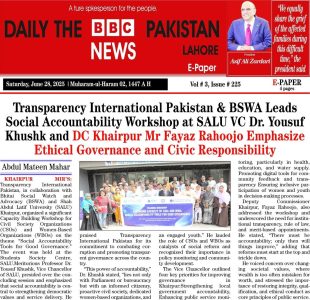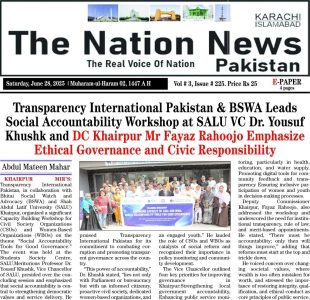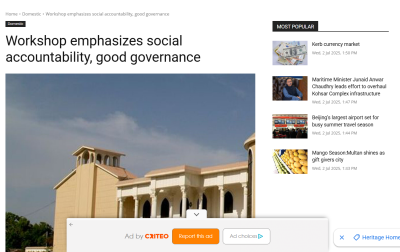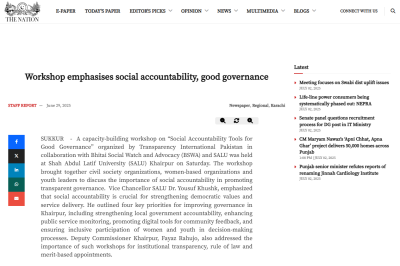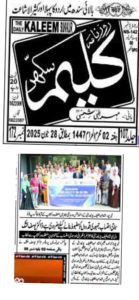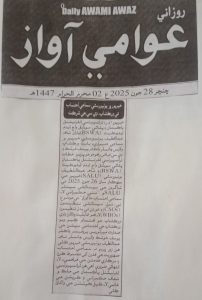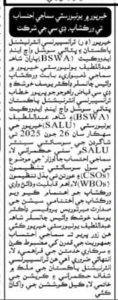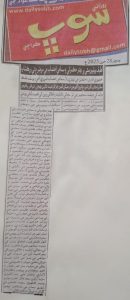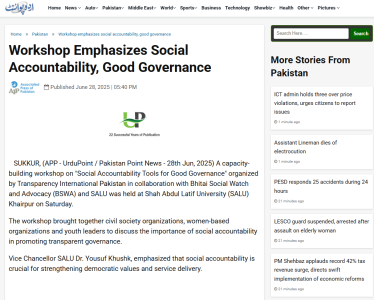Enhancing Capacity of CSOs and WBOs on Social Accountability Tools for Good Governance
Workshop: Enhancing Capacity of CSOs and WBOs on Social Accountability Tools for Good Governance
Venue: Shah Abdul Latif University, district Khairpur, Sindh
Date: June 26, 2025
Transparency International Pakistan, in collaboration with Bhittai Social Watch & Advocacy (BSWA), organized a capacity-building training workshop at Shah Abdul Latif University district Khairpur, Sindh. The workshop aimed to enhance the capacity of Civil Society Organizations (CSOs) and Women-based Organizations (WBOs) on anti-corruption mechanisms and social accountability tools. The workshop brought together representatives from CSOs, WBOs, journalists and district administration.
The workshop commenced with the recitation of the Holy Quran. Mr. Khadim Hussain Mirani, Executive Director of BSWA welcomed the participants and thanked TI Pakistan for organizing the workshop and emphasized the importance of empowering local CSOs on social accountability tools.
The session proceeded with an overview and an icebreaker activity led by Ms. Sonia Arain, Project Coordinator at TI Pakistan, where she engaged participants in a group activity to allow them to introduce themselves and share their motivations. A brief pre-test was conducted to assess the participants’ baseline knowledge on social accountability tools.
Moving on, Ms. Sonia led the discussion on the fundamental concepts and principles of social accountability. She introduced key themes such as participation, transparency, accountability, civic responsibility, and the state’s role in enabling citizens’ participation in accountability mechanisms. She explained that social accountability is a people-centred approach that relies on citizens playing an active role in governance matters and ensuring that the public officials and institutions are delivering on their mandates. These foundational ideas provided participants with a conceptual grounding.
She further presented an overview of TI Pakistan’s work and its social accountability tools, with a special focus on the Right to Information. She highlighted that RTI serves as a cornerstone for enabling transparency and citizen oversight. In doing so, it is a civic tool that promotes trust, accountability and citizens’ participation in governance.
Participants then engaged in a detailed discussion around the Sindh Transparency Right to Information Act 2016. The session helped contextualize the RTI law in Sindh. She walked the participants through the major clauses of the Act, including explaining the procedure on drafting an RTI request.
A group activity followed the discussion, where participants formed small working groups. With the help of flip charts and markers, each group drafted a sample RTI application and mapped out a local governance issue. The activity reinforced the learning of participants.
In the next session, Mr. Saad Aalam Angaria, Assistant Project Coordinator, TI Pakistan, delivered a detailed presentation on whistleblower protection frameworks in Pakistan. He highlighted the essential role whistleblowers play in promoting transparency. He briefed the participants on Whistleblower laws in Pakistan and noted that the Senate has recently approved the Whistleblowers Protection and Vigilance Commissions Act 2025, which will lead to the establishment of an independent body. He further noted that in Sindh, there is no Whistleblower Protection law.
The discussion further focused on gathering participants’ feedback on the Sindh Whistleblowers Protection and Vigilance Commissions Act 2025. The participants were given a draft of the Act formulated by TI and were divided into groups to provide recommendations on how to make the draft more inclusive.
The participants highlighted critical gaps, including the need for strong anonymity clauses, the establishment of an independent provincial oversight body, whistleblower reward and protection systems, and community watchdog mechanisms to flag concerns.
Among the suggested actions were the incorporation of gender-sensitive reporting mechanisms, decentralization of reporting offices to the district level, and mandatory training for public officers on whistleblower protocols.
Moving further, the Vice Chancellor, Shah Abdul Latif University Khairpur, Dr. Yousuf Khushk delivered keynote remarks on the moral foundation of anti-corruption efforts. He stated that real accountability starts at the individual level and highlighted how academic institutions can play a transformative role in nurturing values of honesty, transparency, and ethical governance in students and future leaders. He commended the workshop as a valuable opportunity for civil society and academic stakeholders to connect and build collective momentum for legislative reforms around good governance.
At the end, the Deputy Commissioner of Khairpur Mr. Fayaz Hussain Rahujo delivered closing remarks where he described that the district administration recognizes the important role of CSOs in strengthening good governance. He added that the district government is taking measures to contribute to strengthen social accountability and appreciated TI Pakistan for the workshop in district Khairpur.
The workshop concluded with the administration of a short post-test and participant feedback form. Participants were presented certificates, followed by a networking lunch.
The CSOs appreciated the training workshop and highlighted the need for more trainings to build the capacities of local CSOs to act as promoters of good governance.

